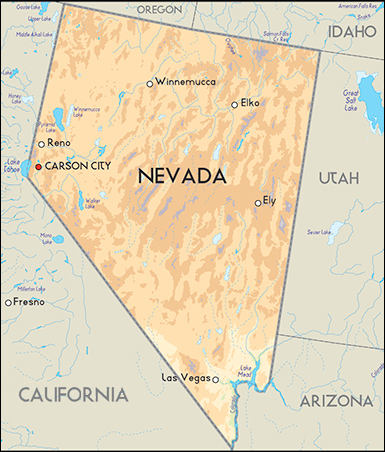By Jim Ellis
 Aug. 22, 2019 — The Nevada Caucus is third on the presidential nomination schedule and it appears the Silver State nomination event will carry more weight than it has in past elections.
Aug. 22, 2019 — The Nevada Caucus is third on the presidential nomination schedule and it appears the Silver State nomination event will carry more weight than it has in past elections.
After the Iowa Caucus (Feb. 3) and New Hampshire primary (Feb. 11), the candidates will stream into Nevada for the Feb. 22 caucus event that is traditionally held on a Saturday.
Nevada could be critically important for two of the candidates, former Vice President Joe Biden and California Sen. Kamala Harris, should the first two states evolve as currently predicted.
Kicking the cycle off in Iowa, Biden may find himself in a similar position to that of Hillary Clinton in 2016. Coming into the state as the clear front runner, Clinton stumbled in Iowa as she technically won the caucus vote, but only after a series of coin flips were conducted to break ties … and she won them all.
The rules are different in 2020, and it will be easier for more people to participate, but Iowa voters tend to like the Midwestern candidates, something Biden is not. Additionally, with Sen. Sanders proving he has a base in the state and two Midwestern candidates in the field, Minnesota Sen. Amy Klobuchar and South Bend Mayor Pete Buttigieg, the chances of Biden faltering here are actually quite high.
Then the candidates will move to Sens. Bernie Sanders’ (I-VT) and Elizabeth Warren’s (D-MA) New England backyard in New Hampshire. In 2016, Sen. Sanders upended Clinton with a 60 percent victory, so Biden’s ability to derail both Sanders and Warren in this state will prove to be a difficult task. Therefore, it is entirely possible that Biden could move into Nevada in search of a badly needed win.
Sen. Harris has a major advantage in that her home state of California will award 416 first-ballot delegates, a figure 45 percent larger than even the second-largest state, which is Texas. But, in order to maximize this advantage, Sen. Harris will have to be competitive in the First Four states.
Since Iowa and New Hampshire do not set up well for her, she must score big in neighboring Nevada, particularly as a jump-start heading into South Carolina the following Saturday (Feb. 29) where she can potentially win, since the African-American vote is so dominant in that state’s Democratic primary.
That being said, it is clear Nevada can now become a trend-setting state for this nomination contest.
Gravis Marketing released a new poll of the Silver State Democratic electorate a couple days ago (Aug. 14-16; 382 likely Nevada Democratic caucus participants from a survey universe of 926 registered voters), which projects Biden with a relatively substantial lead with 25 percent preference, a full 10 points ahead of Sen. Warren’s 15 percent. While Biden’s margin between he and Warren is significant, the fact that both are polling in low numbers suggest much fluidity within the Nevada Democratic vote.
Following the two Gravis poll leaders is Sen. Sanders with 10 percent. He lost the 2016 Nevada Caucus to Clinton on a 46-35 percent vote, with 19 percent voting for an uncommitted slate; and she did even better on the delegate count, recording 27 delegate votes as compared to Sanders’ 16.
But getting even more media play in 2016 than the actual vote count was the physical altercation that broke out at the state party’s Democratic convention where the delegates were selected. After approximately 60 Sanders supporters were denied credentials for the convention, a fight broke out and police had to be summoned to remove the offenders from the Paris Hotel & Casino convention site on the Las Vegas Strip.
At this point, Sen. Harris polls only nine percent in Nevada according to Gravis, with all other candidates posting numbers less than seven percent. Surprisingly, however, it is billionaire Tom Steyer who leads the also-ran candidates at six percent followed by Mayor Buttigieg with five percent. Sen. Cory Booker (D-NJ) has three percent, while all others finish at two percent or below.
While this will be the fourth time that the Nevada Caucus has been a member of the First Four – those states for which party rules allow voting before March 1 – the 2020 event will likely the first instance where this state will gain national attention.
